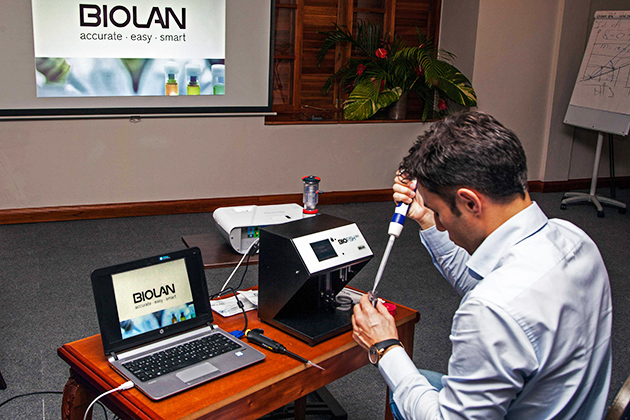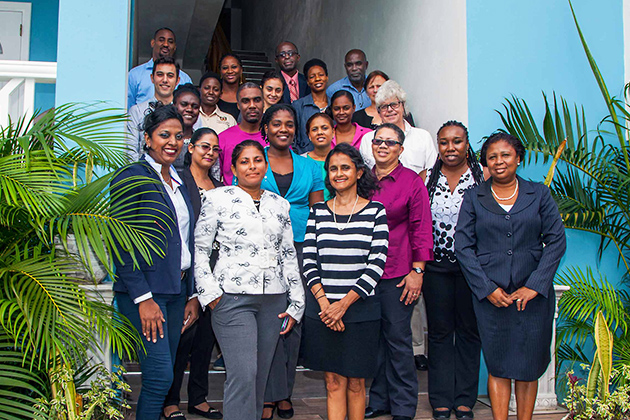Press Release: Belize City, Belize, Friday, 16 December 2016 – A two-week training covering “Food safety in the fishery sector” and “Fishery products laboratory testing” was delivered to 30 inspector and laboratory analysts from 15 CARIFORUM countries during the period 28 November to 9 December 2016, by four international experts.
The training, which covered inspection, control and testing in the fishery sector, was based on eight operational manuals developed under a project funded by the European Union (EU). The training was organized by the Caribbean Regional Fisheries Mechanism (CRFM).
Food safety hazards, best international practices in fish inspection at each stage of the supply chain, controls in aquaculture, and traceability as well as modern approaches to laboratory testing and accreditation were among the key areas addressed. Particular attention was paid to explaining the sanitary requirements for exporting fishery and aquaculture products to the EU and markets in other developed countries. Practical work helped the participants to understand the role of rapid and field testing, to enable better decision-making on the safety of fishery products.

After the course, rapid testing equipment was donated to participants to use in their home countries, and modern histamine testing equipment for assessing the safety of products such as tunas, was also donated to the Fisheries Department of St. Vincent and the Grenadines.
Participants were drawn from Antigua and Barbuda, the Bahamas, Barbados, Belize, the Commonwealth of Dominica, the Dominican Republic, Grenada, Guyana, Jamaica, St. Kitts and Nevis, St. Lucia, Suriname, St. Vincent and the Grenadines, and Trinidad and Tobago. Representatives from the Caribbean Agricultural Health and Food Safety Agency (CAHFSA), based in Paramaribo, Suriname, also attended. The training was highly appreciated by all the participants.
“This course will allow the streamlining of our laboratory testing capabilities and has provided a better understanding of what the EU wants,” said Avis O’Reilly-Richardson, Senior Chemist from the Food Safety & Technology Laboratory, Bahamas.
“There are many areas in my country where there are no controls; e.g. imports, fishing vessels, etc. The information received as well as the discussions with other participants will help me to develop systems for these controls in the future,” another participant said.
Dr. Susan Singh-Renton, CRFM’s Deputy Executive Director and CRFM’s Project Coordinator, welcomed the course saying that it “…allowed the trainees to develop a stronger understanding of the full extent of laboratory and regulatory requirements for fulfilling international sanitary standards for fish and fishery products, and allowed them also to share lessons and best practices in considering possible solutions for many of the challenges faced in putting the methods into actual practice in their home countries.”
The project under whose umbrella the training falls is titled, “Capacity Building of regulatory and industry stakeholders in Aquaculture and Fisheries Health and Food Safety to meet the Sanitary and Phytosanitary Measures (SPS) requirements of international trade.” It was funded under the EU’s “10th EDF Sanitary and Phytosanitary Measures Project and delivered under the technical leadership of the Inter-American Institute for Cooperation on Agriculture (IICA) and the Caribbean Regional Fisheries Mechanism, supported by a team of consultants from Megapesca in Portugal. The aim is to continue to help CARIFORUM countries to improve the safety of fish and fishery products for consumers in national and export markets.
Apart from the delivery of these training courses, the capacity building activity, which started in September 2016 and will run until January 2017, has prepared six new manuals to help fish inspectors apply the best international practices to the inspection of fishing vessels, processing establishments and aquaculture facilities. The subjects covered include Hazard Analysis and Critical Control Points (HACCP), traceability, and for the first time, a compendium of food safety hazards encountered in Caribbean fishery products. In addition, two manuals were prepared under the project for laboratories on the testing of fishery products to ensure food safety and the accuracy of laboratory test results.
The fishery sector is important for many countries in the region, as a source of employment and export revenues. Overall, in 2015, the CARIFORUM countries exported fishery products worth US$378 million to many countries around the world. Whilst 89% of this was from just five countries (Bahamas, Belize, Guyana, Suriname and Trinidad and Tobago), the fishery sector of many other countries in the region delivers supplies directly to their tourist sector. The continued economic importance of the fishery revenue, therefore, depends on ensuring that products meet international sanitary standards. Governments in the region are, therefore, very interested in ensuring that regionally important food safety hazards, such a ciguatera and histamine, are under control.
The EU project “10th EDF Sanitary and Phytosanitary Measures Project” has the expected result that capacities will be strengthened at the national and regional levels for health and food safety requirements of fisheries and aquaculture (inland, marine) products, which will also ensure safe food standards for fisheries products in the region, while meeting the requirements of the region’s trading partners worldwide.














